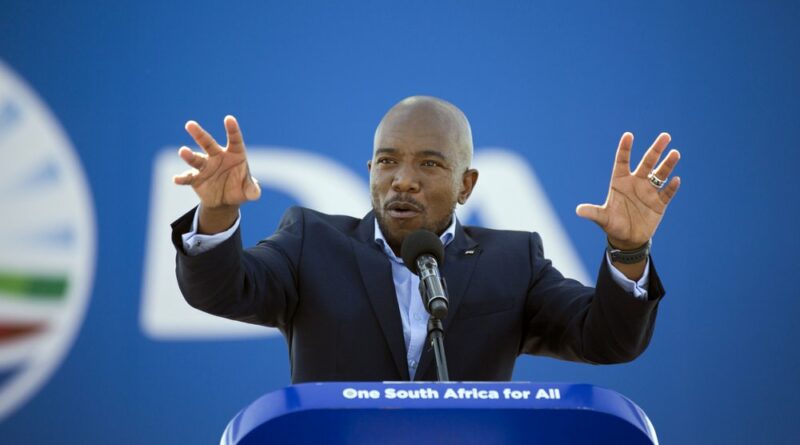Chaos in South Africa’s opposition party as black leader quits
JOHANNESBURG -— The effort by South Africa’s biggest opposition party to appeal to black voters is in tatters following the resignation of its first black leader and other top officials, highlighting deep racial divisions that remain in the country a quarter-century after the end of the harsh system of apartheid.
Mmusi Maimane quit the Democratic Alliance on Thursday after stepping down as party leader the day before, leaving many South Africans to predict that black supporters would flee as well.
Maimane and other officials resigned just days after the return of Helen Zille, a divisive figure who once famously tweeted that colonialism wasn’t all bad, pointing to industrial development and educational advances under colonial rule. That 2017 tweet is still hotly criticized today.
Zille’s new role as national chair has been interpreted by many as the return of the DA to its “rightful owners,” South Africa’s white minority.
“Despite my best efforts, perhaps the DA is not the best vehicle to take forward the fight for one South Africa for all,” Maimane said, following the party exit of another prominent black DA figure, Johannesburg mayor Herman Mashaba, earlier this week.
Both were criticized in an internal report for the party’s lackluster performance in the national elections in May. Support for the DA slipped to 20% of votes from 22% in the previous elections. The DA lost support from some of its more conservative white voters, who opted instead for the right-wing Afrikaner party Freedom Front Plus.
The internal report was critical of Maimane’s leadership and blamed him for the drop in white support.
“The relentless focus of winning over black supporters was understandable, but taking existing voters for granted was always a mistake,” it said. “It is striking that over a period of many years, the DA failed to heed a number of warnings that it was alienating sections of the white Afrikaans electorate.”
Although Zille, a former anti-apartheid journalist, stepped aside in 2015 to allow Maimane to lead the party, she has been re-asserting herself and is widely viewed to have been behind the criticism of him.
Maimane’s election as the party’s first black leader was significant, and the DA gained ground in black communities despite its history. It was formed in 2000 as a result of a merger between the former liberal, white Democratic Party and the New National Party, a re-branded offshoot of the National Party which implemented the old segregation policy of apartheid.
Under Maimane the DA won control of key urban areas in 2016 and party members became mayors in Johannesburg, Pretoria and elsewhere.
For the first time an opposition party was posing a growing threat to the African National Congress, the former liberation movement that has ruled South Africa since the end of apartheid and won elections by comfortable margins, confident of the support of black voters.
The DA attracted other black politicians including Lindiwe Mazibuko, who became the party’s parliamentary leader, and Patricia de Lille, who became mayor of the DA-governed city of Cape Town. Both later resigned, reportedly after clashing with Zille. De Lille has gone on to found her own party.
Now the DA will find it hard to attract the support of black South Africans and avoid the resignations of other black leaders, said Ralph Mathekga, a political analyst and researcher at the University of the Western Cape.
Maimane and Mashaba may well decide to start their own political party, Mathekga said. “They are credible leaders and some people feel they have been failed by the DA. There is certainly room for them to explore that space.”
They might even be courted by the South African opposition party that gained ground in this year’s election, the populist Economic Freedom Fighters, who have won support among people fed up with the country’s high unemployment and dramatic economic inequality.
“You are a good human being, don’t be discouraged, my big brother,” EFF leader Julius Malema tweeted at Maimane on Thursday.
The DA will now prepare for the 2021 local government elections, which may give initial indications of what price the party will pay for losing black leaders like Maimane and Mashaba and being perceived as a white-minority party that refuses to transform.
Following Maimane’s resignation, the DA said it will elect a new leader as soon as possible.
“Where will they get a black to head the party now?” asked veteran commentator Barney Mthombothi. “To appoint a white would confirm all the criticism that it is a party for whites … It’s not just the DA’s problem, it’s South Africa’s problem. We need parties that will unite people as a whole, that will pull all our races together.”
Twenty-five years after the end of apartheid, “race is part and parcel of South Africa’s politics,” Mthombothi said. “How do we move forward and leave race behind? We are still hampered by the legacy of apartheid.”
AP

